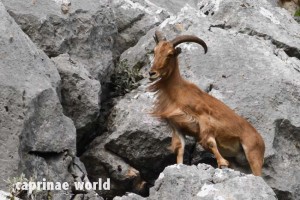Mosor and Biokovo Mountains, Croatia
I went to Croatia between April 24th and 27th 2019. I had two days for Aoudad, one for Balkan Chamois and one morning for Mouflon. Here is my illustrated report: http://www.wilddocu.de/mosor-and-biokovo-mountains-croatia/

Thanks for your interest, Ralf
10 Comments
-
jeroen
With introduced I was only pointing at the aoudad. Good point about its future in Africa. Mouflon (eastern type) might have been native too once I think? I still do not like the idea of hunters who would love to kill wolves so they can shoot more of their introduced trophy game though. Best regards, Jeroen.
-
Mattia from Italy
Absolutely no. Mouflon is a very ancient breed of sheep brought to Sardinia during Neolithic age from Anatolia. No fossil bones of Mouflon have ever been found in Europe. And, during historic (mostly Phoenician and Roman) and modern times, it has been introduced to Corsica and other Mediterranean places for various reasons.
By the way, Italy is the only European place with Crested Porcupine because Romans introduced them in Italy because, at that time, it was a food delicacy. Romans used to bred even Western and Eastern Hedgehogs.
-
-
jeroen
‘No fossil bones of Mouflon have ever been found in Europe.’
Ik knew that they were introduced a long time ago, I just thought I red somewhere that hey once lived in the Balkans too. I guess that information was wrong or they ment pleistocene times?
But Walkers mammals says ‘Ovis orientalis… probably in the Crimea and Carpathian mountains until about 3000 years ago…’, that’s Europe too right, so now I am even more confused…-
Mattia from Italy
The (few) fossil bones from ice age found in Europe regard an extinct “mountain sheep” and not Ovis orientalis. Paitings in Spanish caves depict Ibex females or maybe this “mountain sheep”. Surely no Ovis sp. lived in Europe after the ice age.
Mouflon is now very widespread: it has been reintroduced even in Hawaii and Kerguelen island (!).
-
-
Antee
Calm down please.
Ralf did a very clear message with his information about the place and about the guide. Then it is up to everyone if you find this attractive or not.
It is not Ralf who hate Wolves…
Come on now. I have met a few guides as “Wolf-haters” myself during my years and others who favour shooting animals for various reasons.
You mean I shouldn´t write Trip reports when having guides like this?Should mammalwatching take away every single report from Marrick game Farm – South Africa as well? Who is largely a game hunting farm with introduced animals and not for mammalwatching?
You have a very rude tone against Ralf and I don´t think it´s fair as he only gave as much information he should do for an informative trip report.
Let´s be friends 🙂
-
Vladimir Dinets
There are Early Pleistocene fossils of large argali-type Ovis from France, and early Late Pleistocene ones from the Crimea, but nothing younger than 100,000 years. I don’t know what the claim about the Carpathians is based on. Extensive Late Pleistocene fossil assemblages in Romania and elsewhere in Europe don’t include any sheep, unless I’ve missed something.
As for aoudad going extinct in North Africa, it’s possible, of course, but there are huge introduced populations in North America, Spain etc. I don’t know if they are sourced from the same subspecies as the one in Croatia.
Leave a Reply
You must be logged in to post a comment.


jeroen
With all respect, but to me this feels a bit like an advertisement for a potential wolfkiller that shows people introduced animals. Anyone?